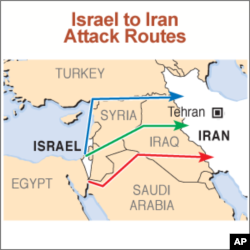Israeli Prime Minister Benjamin Netanyahu comes to Washington next week to discuss his country’s heightened concern over Iran’s nuclear program. Israeli officials have warned of a possible preemptive strike on Iranian nuclear facilities, but the U.S. is trying to dissuade Israel from such action. An attack would present formidable obstacles for Israel and might only bring a temporary halt to Iranian weapons-related nuclear activity.
Israel is concerned that a window of opportunity is fast closing as Iran starts moving some of its uranium enrichment facilities to hardened underground sites. The concern has fueled talk of possible Israeli bomb and missile strikes on Iranian facilities.
Michael Eisenstadt, director of Military and Security Studies at the Washington Institute for Near East Policy, says Israeli aircraft could reach the Iranian targets if they know where all of them are.
“I think they have the range, they have the weapons systems, they have the ordnance that they could drop on these facilities. The question is whether they have the intelligence and whether they have the ability to impose significant enough damage to justify the risk from their point of view,” Eisenstadt said.
But analysts say that for a successful strike, the attack plan would have to be perfect, the intelligence flawless, the weather clear, and the targeting accurate.
Analysts say the Israelis would have to jam Iranian warning systems and also knock out - “suppress” in military jargon - all air defenses, assuming that they know where they are.
Intelligence historian Matthew Aid says the chances of success, at least in theory, are not good. He questions whether Israel has sufficiently powerful bombs, known as “bunker busters,” capable of destroying hardened facilities.
"They may be able to damage badly the Natanz uranium enrichment facility, which is near the city of Esfahan. But the Fordow uranium enrichment facility, which is near the holy city of Qom, is built into the side of a mountain and may be impervious to the kind of munitions that the Israelis currently possess," Aid said.
Any aerial path from Israel to Iran would require refueling en route, making the fighter-bomber aircraft vulnerable over potentially hostile airspace, such as Jordan, Iraq, Saudi Arabia, or Syria. Michael Eisenstadt, however, believes that may not be a problem.
"Given attitudes in the Arab world towards Iran and Iran’s nuclear program, I think a lot of Arab countries would quietly applaud if Israel were to do this. And if Israel had to overfly their territories in order to get to Iran, I don’t think that they would do anything," Eisenstadt said.
But on one point analysts agree: any strike at Iran will at best retard Iran’s nuclear program, perhaps for a year or two…and will almost certainly invite Iranian retaliation against Israel and perhaps against U.S. and allied interests as well.




